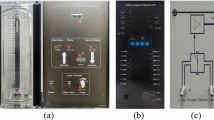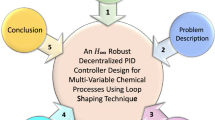Abstract
In this paper, a new analysis and design method for proportional-integrative-derivative (PID) tuning is proposed based on controller scaling analysis. Integral of time absolute error (ITAE) index is minimized for specified gain and phase margins (GPM) constraints, so that the transient performance and robustness are both satisfied. The requirements on gain and phase margins are ingeniously formulated by real part constraints (RPC) and imaginary part constraints (IPC). This set of new constraints is simply related with three parameters and decoupling of the remaining four unknowns, including three controller parameters and the gain margin, in the nonlinear and coupled characteristic equation simultaneously. The formulas of the optimal GPM-PID are derived based on controller scaling analysis. Finally, this method is applied to liquid level control of coke fractionation tower, which demonstrate that the proposed method provides better disturbance rejection and robust tracking performance than some commonly used PID tuning methods.
Similar content being viewed by others
References
J. G. Ziegler, N. B. Nichols. Optimum setting for automatic controller. Transactions of the American Society of Mechanical Engineers, vol. 64, pp. 759–768, 1942.
K. L. Chien, J. A. Hrones, J. B. Reswick. On the automatic control of generalized passive systems. Transactions of the American Society of Mechanical Engineers, vol. 74, pp. 175–185, 1952.
K. J. Åström, P. R. Kumar. Control: A perspective. Automatica, vol. 50, no. 1, pp. 3–43, 2014.
M. R. Matausek, B. T. Jevtović, I. M. Jovanov. Series PID controller tuning based on the SIMC rule and signal filtering. Journal of Process Control, vol. 24, no. 5, pp. 687–693, 2014.
R. Vilanova, A. Visioli. PID Control in the Third Millennium: Lessons Learned and New Approaches, London, UK: Springer, 2012.
I. Boiko. Non-parametric Tuning of PID Controllers: A Modified Relay-feedback-test Approach, London, UK: Springer, 2013.
I. M. Horowitz. Synthesis of Feedback Systems, New York, USA: Academic Press, 1963.
K. J. Åström, T. Hagglund. Automatic tuning of simple regulators with specifications on phase and amplitude margins. Automatica, vol. 20, no. 5, pp. 645–651, 1994.
D. K. Maghade, B. M. Patre. Decentralized PI/PID controllers based on gain and phase margin specifications for TITO processes. ISA Transactions, vol. 51, no. 4, pp. 550–558, 2012.
Z. Y. Nie, Q. G. Wang, M. Wu, Y. He. Tuning of multiloop PI controllers based on gain and phase margin specifications. Journal of Process Control, vol. 21, no. 9, pp. 1287–1295, 2011.
Q. G. Wang, H. W. Fung, Y. Zhang. PID tuning with exact gain and phase margins. ISA Transactions, vol. 38, no. 3, pp. 243–249, 1999.
Q. G. Wang, Z. Ye, C. C. Hang. Tuning of phase-lead compensators for exact gain and phase margins. Automatica, vol. 42, no. 2, pp. 349–352, 2006.
S. Alcántara, R. Vilanova, C. Pedret. PID control in terms of robustness/performance and servo/regulator trade-offs: A unifying approach to balanced autotuning. Journal of Process Control, vol. 23, no. 4, pp. 527–542, 2013.
K. Y. Li. PID tuning for optimal closed-loop performance with specified gain and phase margins. IEEE Transactions on Control Systems Technology, vol. 21, no. 3, pp. 1024–1030, 2013.
J. F. Leu, S. Y. Tsay, C. Hwang. Use of B-splines to obtain accurate transient responses for feedback control systems with time delays. Chemical Engineering Communications, vol. 178, no. 1, pp. 199–219, 2000.
Y. G. Wang, H. H. Shao. PID autotuner based on gainand phase-margin specifications. Industrial and Engineering Chemistry Research, vol. 38, no. 8, pp. 3007–3012, 1999.
A. Visioli. A new design for a PID plus feedforward controller. Journal of Process Control, vol. 14, no. 4, pp. 457–463, 2004.
S. Skogestad, I. Postlethwaite. Multivariable Feedback Control Analysis and Design, London, UK: Wiley, 2005.
M. G. Lin, S. Lakshminarayanan, G. P. Rangaiah. A comparative study of recent/popular PID tuning rules for stable, first-order plus dead time, single-input single-output processes. Industrial and Engineering Chemistry Research, vol. 47, no. 2, pp. 344–368, 2008.
H. P. Huang, J. C. Jeng, K. Y. Luo. Auto-tune system using single-run relay feedback test and model-based controller design. Journal of Process Control, vol. 15, no. 6, pp. 713–727, 2005.
O. Garpinger, T. Hägglund, K. J. Åström. Performance and robustness trade-offs in PID control. Journal of Process Control, vol. 24, no. 5, pp. 568–577, 2014.
Z. Q. Gao. Scaling and bandwidth-parameterization based controller tuning. In Proceedings of the American Control Conference, IEEE, Denver, USA, vol. 6, pp. 4989–4996, 2006.
P. García, P. Albertos. A new dead-time compensator to control stable and integrating processes with long deadtime. Automatica, vol. 44, no. 4, pp. 1062–1071, 2008.
R. D. Zhang, S. Wu, F. R. Gao. Improved PI controller based on predictive functional control for liquid level regulation in a coke fractionation tower. Journal of Process Control, vol. 24, no. 3, pp. 125–132, 2014.
M. Shamsuzzoha, M. Lee. IMC-PID controller design for improved disturbance rejection of time-delayed processes. Industrial and Engineering Chemistry Research, vol. 46, no. 7, pp. 2077–2091, 2007.
D. Shi, J. Wang, L. Ma. Design of balanced proportionalintegral-derivative controllers based on bilevel optimization. IET Control Theory and Applications, vol. 5, no. 1, pp. 84–92, 2011.
Author information
Authors and Affiliations
Corresponding author
Additional information
This work was supported by National Natural Science Foundation of China (Nos. 61403149 and 61273069), Natural Science Foundation of Fujian Province (No. 2015J01261), and the Scientific Research Foundation of National Huaqiao University.
Recommended by Associate Editor Giuliano Premier
Zhuo-Yun Nie received the B. Sc. degree in automation from Central South University, China in 2006, and Ph.D. degree in control theory and control engineering from Central South University, China in 2012. He is currently a lecturer in the School of Information Engineering, Huaqiao University, China.
His research interests include robust control, nonlinear control, and financial forecasting.
ORCID iD: 0000-0002-5980-3268
Rui-Juan Liu received the B. Sc. and M. Sc degrees in mathematics from Changsha University of Science and Technology, China in 2004 and 2007, respectively, and Ph.D. degree in control theory and control engineering from Central South University, China in 2014. She is currently a lecturer in the School of Applied Mathematics, Xiamen University of Technology, China.
Her research interests include robust control, nonlinear control, and fractional-order system.
Fu-Jiang Jin received the M. Sc. and Ph.D. degree in control theory and control engineering from Zhejiang University, China in 1998 and 2002, respectively. He is currently a professor in the School of Information Engineering, Huaqiao University, China.
His research interests include process modeling and control.
Lai-Cheng Yan received the B. Sc. and M. Sc degrees in electrical engineering from Chongqing Communication Institute and Chongqing University, China in 2004 and 2007, respectively. He is currently a lecturer in the School of Information Engineering, Huaqiao University, China.
His research interests include robot modeling and control.
Rights and permissions
About this article
Cite this article
Nie, ZY., Liu, RJ., Jin, FJ. et al. Analysis and design of scaling optimal GPM-PID control with application to liquid level control. Int. J. Autom. Comput. 13, 624–633 (2016). https://doi.org/10.1007/s11633-016-0998-y
Received:
Accepted:
Published:
Issue Date:
DOI: https://doi.org/10.1007/s11633-016-0998-y




